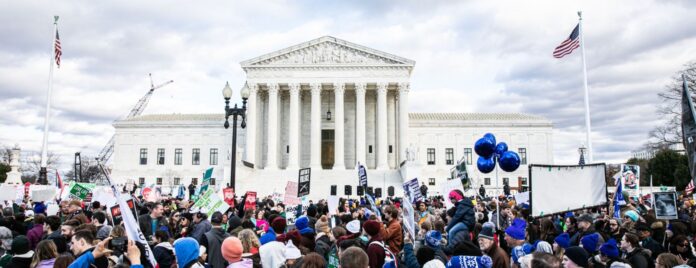Two years after committing to withdraw from the abortion-regulation business, the US Supreme Court finds itself once again in the midst of the controversy, potentially impacting reproductive rights and the upcoming November election.
The court’s decision in 2022 to overturn Roe v. Wade transformed the legal and political landscape, opening the door for stricter restrictions or bans on abortion in Republican-led states. This provided Democrats with a powerful political issue as they fight to preserve abortion access.
Two impending arguments are expected to reignite the debate. The court will first consider limiting access to a widely used abortion drug followed by a case next month regarding state bans even when a doctor in the emergency room believes terminating a pregnancy is necessary to save the mother’s life. Both cases pit the Biden administration against a Christian legal group leading the charge against abortion in the courthouse.
With rulings anticipated by the end of June, these cases are likely to serve as a mid-campaign reminder about abortion, highlighting the substantial influence of the conservative-controlled high court and the importance of the November election on abortion access.
“There’s a lot of ways in which this could make who’s in the White House more important and also just make the abortion issue more salient,” said Mary Ziegler, a law professor at the University of California, Davis, who specializes in the legal battle over abortion. “If you have major rulings on abortion about half a year before the election, it would make the issue more front of mind for voters who may otherwise be thinking about something else.”
In the aftermath of the Supreme Court’s 2022 ruling in Dobbs v. Jackson, the Guttmacher Institute reports that 14 states now ban abortion in almost all circumstances, with seven others implementing limits that were previously considered unconstitutional.
Election Impact
The 2022 midterm elections saw a surge in Democrat support, with abortion-rights candidates and ballot measures gaining significant victories. The abortion issue played a critical role in helping Democrats retain control of the Senate and secure a slim Republican majority in the House.
Similarly, the 2023 election witnessed success for abortion-rights advocates in Ohio ballot initiatives and Democrats taking over the Virginia state legislature following a proposal for a 15-week abortion ban by the Republican governor.
Dobbs was deemed an “unforced error” by Republicans, which they now must navigate around, according to Lisa Camooso Miller, a GOP strategist and former Republican National Committee communications director. “I’ve heard other Democrats say that this is the gift that keeps on giving. I don’t think they’re wrong.”
These upcoming legal battles mark the first major abortion confrontations since the conservative majority shifted in 2022, stating that their Dobbs decision would “return the issue of abortion to the people’s elected representatives.”
Widespread Use
The court will hear arguments on Tuesday concerning restrictions on mifepristone, a pill utilized in over half of US abortions. The Biden administration is challenging a ruling that would limit mail-order prescriptions and mandate in-person doctor visits.
The court is reviewing a decision by the 5th US Circuit Court of Appeals to reverse changes made by the Food and Drug Administration since 2016, including the FDA’s 2021 choice to eliminate the requirement for in-person medical provider visits. The appeals court argued that the FDA did not adequately address safety concerns.
Abortion-rights advocates refute this analysis, arguing that there is significant medical and scientific evidence supporting the safety of mifepristone and the use of telemedicine to dispense the drug.
If the court rules in favor of abortion opponents, it would mark the first instance of the Supreme Court questioning the FDA’s judgment on the safety and effectiveness of an approved medication.
Emergency Rooms
The second case, scheduled for argument on April 24th, will test whether Idaho’s near-total abortion ban must comply with a federal law requiring hospitals receiving Medicare funds to provide “necessary stabilizing treatment” to patients in emergencies.
The Biden administration argues that the Emergency Medical Treatment and Active Labor Act (EMTALA) mandates hospitals to perform abortions when necessary to avert a serious health risk to the mother. Idaho, which currently permits abortion only to save the mother’s life, contends that EMTALA does not necessitate abortion and instead requires hospitals to provide stabilizing care for the fetus.
The court’s ruling will impact other states with comprehensive bans, including Texas, which is embroiled in a similar legal battle against the administration. Additionally, the decision could offer insight into the justices’ perspective on extensive constitutional issues such as “fetal personhood,” advanced by conservative advocates.
In both cases, the administration is opposing Alliance Defending Freedom, a Christian organization instrumental in the campaign to overturn Roe v. Wade and in advocating for expanded religious rights before the court.
Jim Campbell, legal counsel for the group, alleges that the administration is attempting to undermine states’ views that oppose abortion, both in the EMTALA case and the FDA case.
Abortion-rights advocates argue that it is the opponents who are seeking to exceed the boundaries of the law and extend beyond what was accomplished in Dobbs.
“Abortion opponents were never going to stop at overturning Roe,” said Diana Salgado, a lawyer with Planned Parenthood Federation of America. “This was never about returning the issue to the states. The intention has always been to control people’s personal medical decisions and restrict abortion access.”
The lead cases under discussion are Food and Drug Administration v. Alliance for Hippocratic Medicine, 23-235, and Moyle v. United States, 23-726.
–With assistance from Hadriana Lowenkron.
To contact the reporter on this story:
To contact the editors responsible for this story:
Steve Stroth
© 2024 Bloomberg L.P. All rights reserved. Used with permission.
